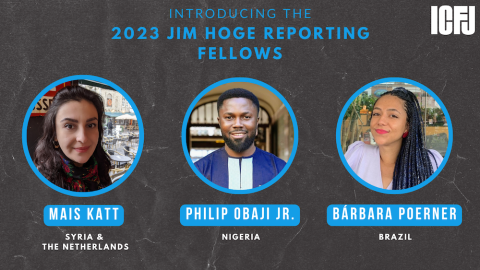
Throughout his exceptional career, former ICFJ Board Chairman James F. Hoge Jr. embodied the best of journalism. He was a venerated leader as editor of the Chicago Sun-Times and publisher of the New York Daily News. In his 18 years as editor of Foreign Affairs, Hoge demonstrated unmatched excellence in fact-based journalism and offered deep analysis of pressing global issues.
To carry forward Hoge's legacy and his passion for journalistic integrity, ICFJ launched the Jim Hoge Legacy Fund. Through three-month reporting fellowships, the Fund supports rising news leaders at home and abroad, helping the next generation of journalists safely and effectively report on pressing global issues, from disinformation to climate change to rising authoritarianism.
About the 2023 Fellows
The inaugural Jim Hoge Fellows were Mais Katt of Syria, Philip Obaji Jr. of Nigeria, and Bárbara Poerner of Brazil. Each fellow was selected from ICFJ’s vast network of U.S. and international journalists and demonstrates dedication to the same high standards that Hoge built his career around.
Mais Katt (Syria & The Netherlands)
Katt has closely covered the Syrian war for 10 years. She is the editor and fact-checker of The Syria Trials podcast, which illustrates the scattered landscape of justice and accountability efforts for the crimes committed by war criminals in Syria. Katt is an experienced media trainer and news business developer, having collaborated with Lighthouse Reports and two long-time ICFJ partners, the Arab Reporters for Investigative Journalism (ARIJ) and the Organized Crime and Corruption Reporting Project (OCCRP). She also serves as the MENA editor for the Environmental Investigative Forum (EiF). Katt has conducted training programs for hundreds of journalists in the MENA region, including for ICFJ.
As a Jim Hoge Reporting Fellow, Katt developed Women Who Won the War, a platform for long-form multimedia investigations focusing on women in conflict zones. The story, Three Women Who Won the War, reports on the perspectives of three Syrian women from the start of the demonstrations in 2011 to the present day. By sharing their experiences of being in the diaspora, staying in Syria, and working in women-centered organizations, Katt's work focuses on reframing women as advocates for peace, justice and freedom rather than as victims.
Philip Obaji Jr. (Nigeria)
Obaji is a correspondent for The Daily Beast covering sub-Saharan Africa. His coverage includes reporting on jihadism, human trafficking, human rights and, more recently, the activities of Russia's Wagner Group in Africa. He won the Future Awards Africa Prize in Education in 2014, and the Future Awards Africa Prize for Young Person of the Year in 2015. Obaji was listed among the 100 most influential people in Nigeria in 2016 by the Nigerian news website, YNaija. In 2022, he was awarded the Jaime Brunet International Prize for the promotion of human rights by the Public University of Navarra in Spain.
Obaji was awarded a Jim Hoge Reporting Fellowship for his project to continue investigating the Wagner Group’s actions in Africa, particularly the “climate of terror and complete impunity” that a United Nations working group has described. For his long-form reporting project, Obaji published one of the 2023's most powerful stories, an in-depth investigation on the operations of Russian paramilitaries in the Central African Republic (CAR) following the death of Wagner boss Yevgeny Prigozhin. The account revealed how Russian mercenaries slaughtered dozens of people to secure access to a gold mine in northern CAR. As a response to the story, the CAR government promised an investigation into the attacks.
Bárbara Poerner (Brazil)
Poerner reports at the intersection of women's rights, climate justice and cultural issues, working for media outlets Climainfo Institute and EmpoderaClima, and collaborating as a freelance reporter with other Brazilian media. Previously, she worked as a reporter for ELLE Brasil magazine and has experience with audiovisual reporting, including documentary web series and podcasts.
As part of her fellowship, Poerner published Monocultura da Energia (Monoculture of Energy), a four-part docu-series that explores how energy projects across South America - whether renewable or not - can have disastrous consequences for local communities, including Indigenous people, and are part of the climate crisis. Her final episode includes recommendations for a fair, free and community-oriented energy transition that protects the rights of both humans and minimizes harm to the planet.

